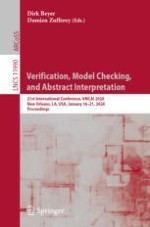2020 | OriginalPaper | Buchkapitel
Harnessing Static Analysis to Help Learn Pseudo-Inverses of String Manipulating Procedures for Automatic Test Generation
verfasst von : Oren Ish-Shalom, Shachar Itzhaky, Roman Manevich, Noam Rinetzky
Erschienen in: Verification, Model Checking, and Abstract Interpretation
Aktivieren Sie unsere intelligente Suche, um passende Fachinhalte oder Patente zu finden.
Wählen Sie Textabschnitte aus um mit Künstlicher Intelligenz passenden Patente zu finden. powered by
Markieren Sie Textabschnitte, um KI-gestützt weitere passende Inhalte zu finden. powered by
